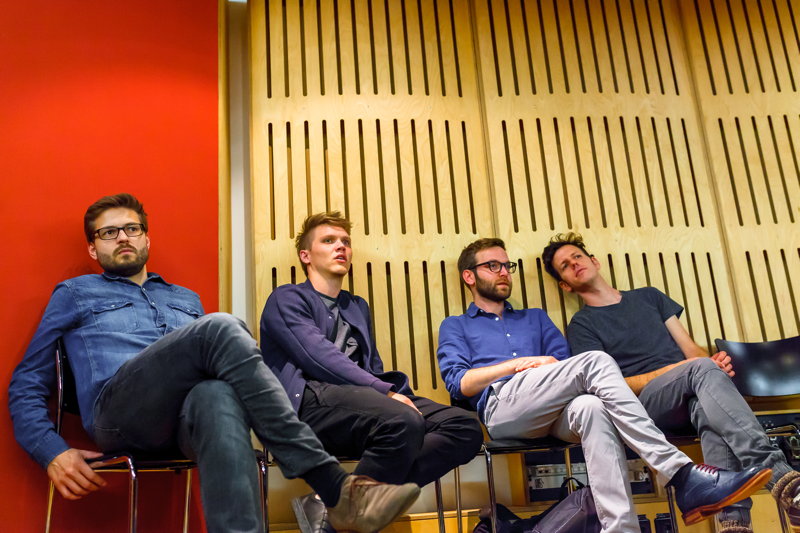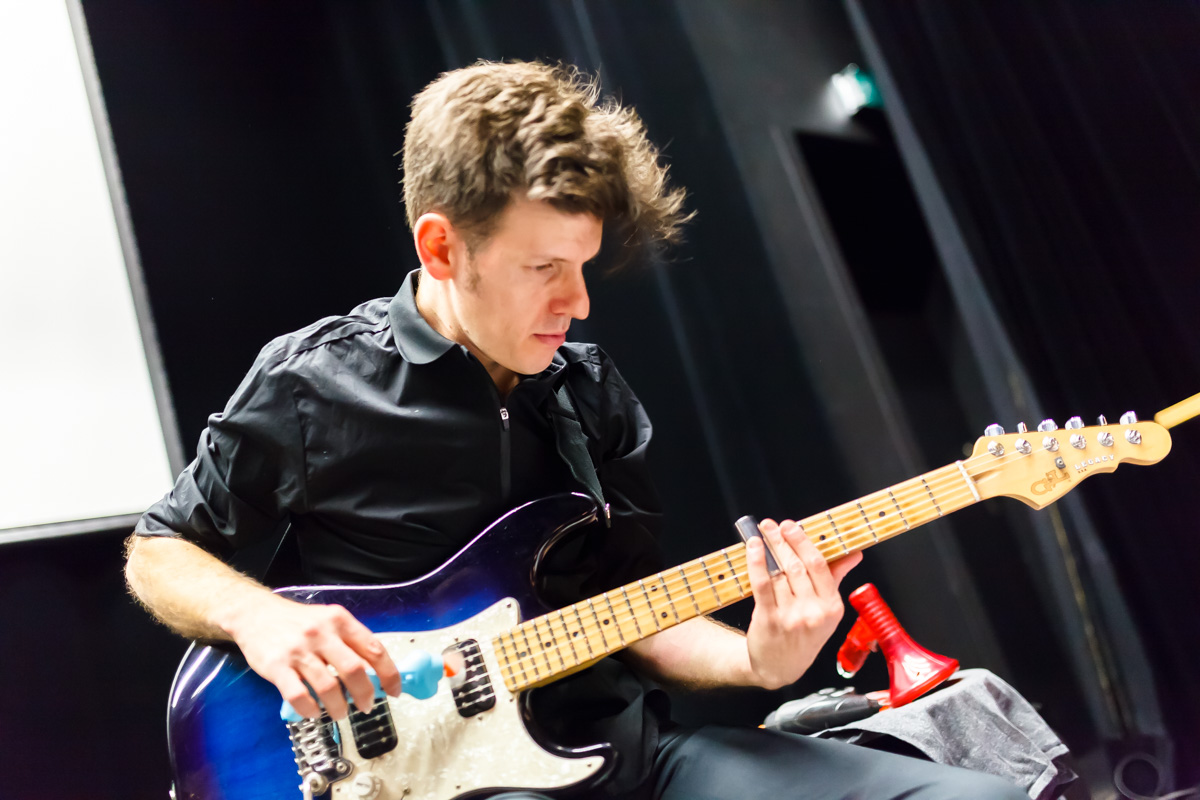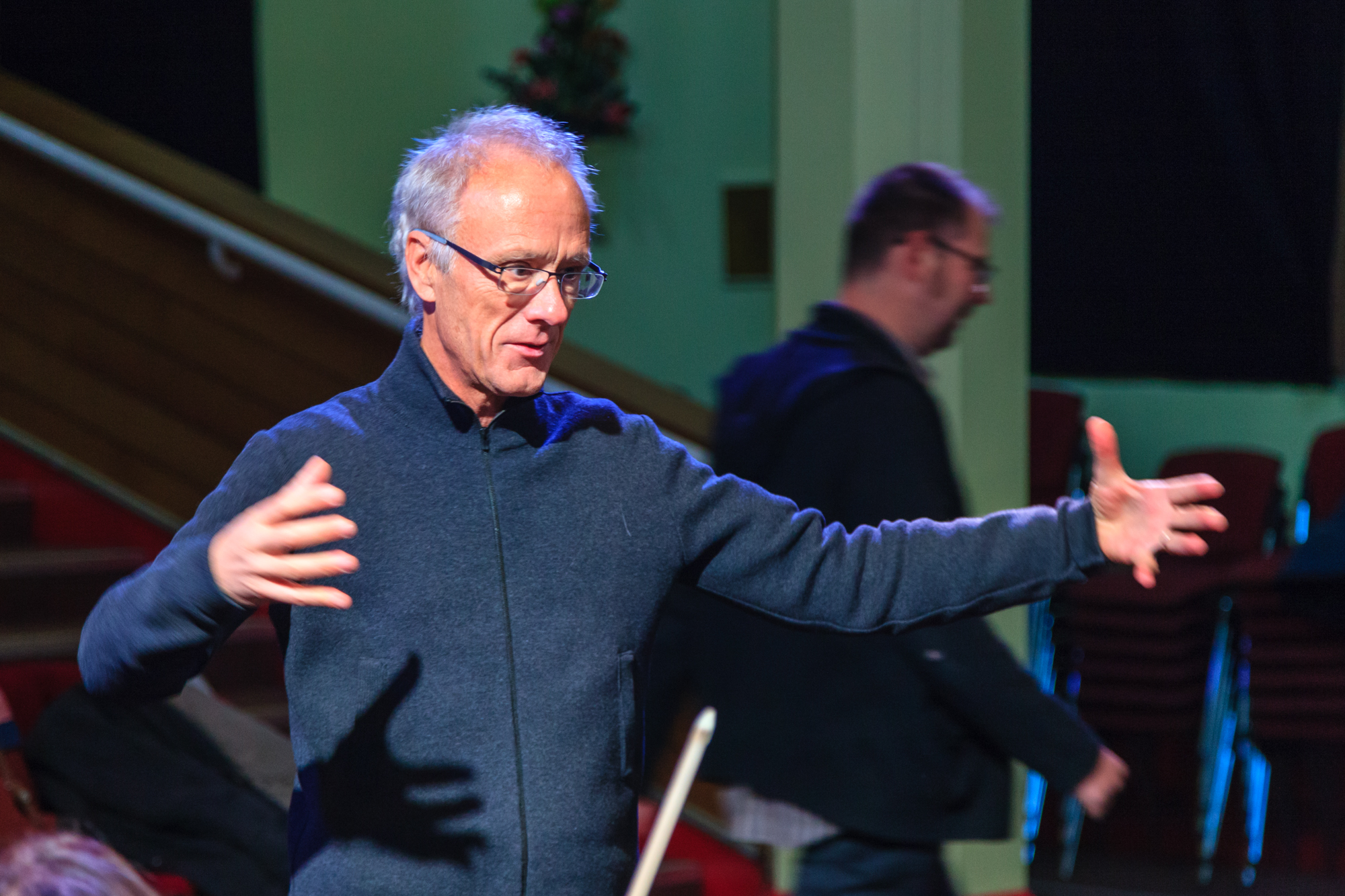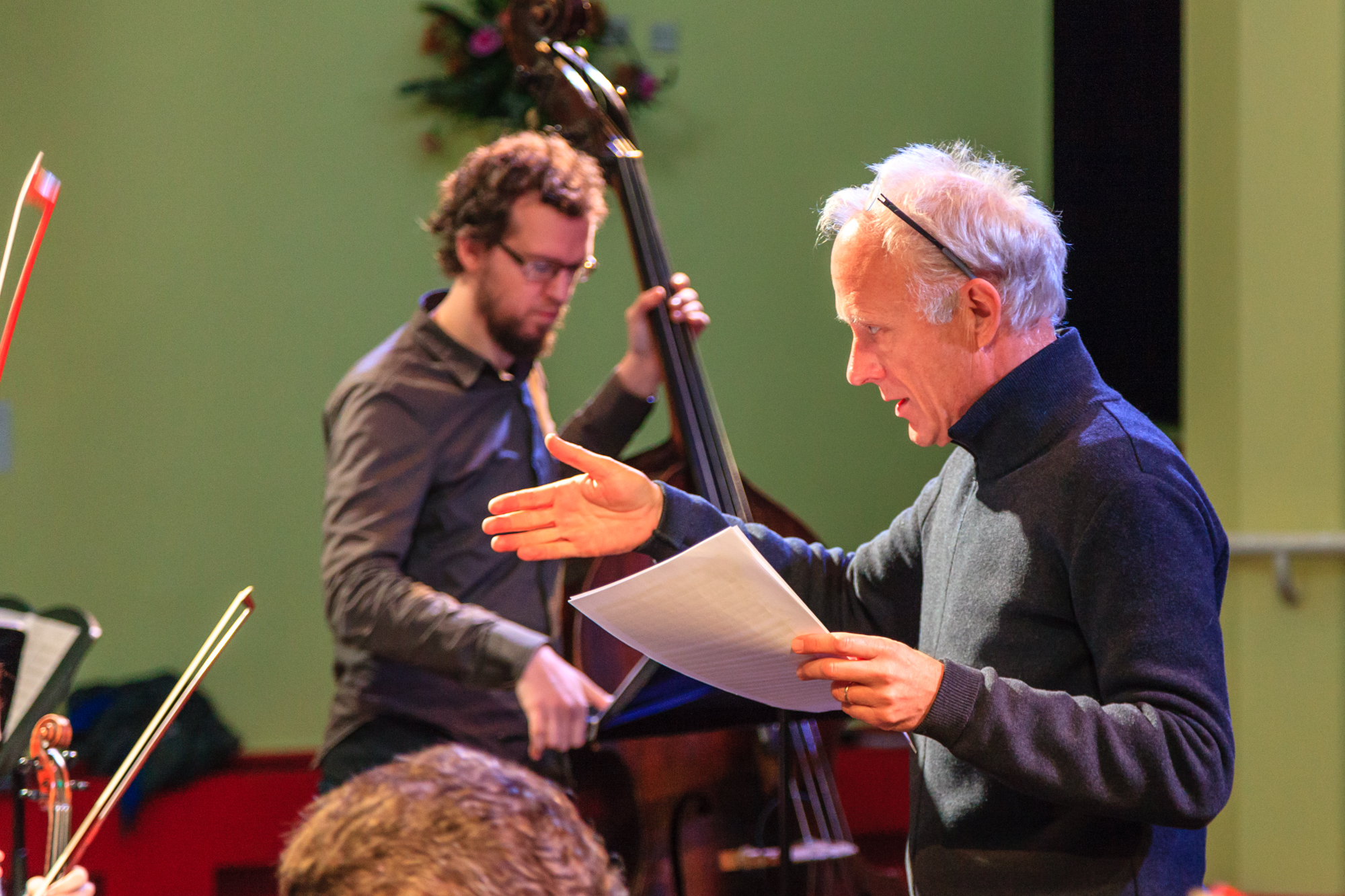Gabrielle Weber
Donaueschingen’s centenary – a historic event: since 100 years now, this defining institution commits to contemporary music’s preservation and spread. The most important European festival re new music – renown place of world premieres, encounter and debate – will celebrate its 100th birthday with numerous events from October 14 to 17, featuring many historic friends and companions.
The young, Swiss-based ensemble Nikel will be part of this celebration. Yaron Deutsch, electric guitarist and head of Nikel, has already been to Donaueschingen several times with the ensemble and as a soloist. For its anniversary, Nikel will perform new pieces by Rebecca Saunders and young Turkish composer Didem Coskunseven. Deutsch is also the soloist of a new piece by Stefan Prins with the Orchestre Philharmonique du Luxembourg.

Founded in 2006, Nikel now tours worldwide and celebrates its fifteenth anniversary. Its unusual instrumentation, with electric guitar, piano, saxophone and percussion dates back to the very first performance and provides their characteristic ‘alternative chamber music sound’ with a mixture of electronic and organic sounds. The constantly expanding repertoire consists exclusively of original pieces composed for the ensemble.
I had an early morning talk with Yaron Deutsch from his hotle room in Parma via Zoom, on a Saturday. He is a morning person and was up since 4:30am. After performing at the Traiettorie festival for contemporary music, he would head to rehearsals in Bern.
How did you find your way to contemporary classical music with the electric guitar…?
In 2005 I was searching for my own musical identity. As electric guitarist I was playing mainly rock and jazz, but felt like a ‘copy cat’ of an American culture that doesn’t belong to me. I then came across a piece by Luis Andriessen: ‘Hout‘ (1991) for saxophone, electric guitar, percussion and piano, that felt like a ‘eureka’ moment. The piece mixes musical genres and elements in a straightforward way. I found a connection to my European roots that felt like home in the European classical music avant-garde, that somehow showed me the direction of the musical landscape I was looking for.

How did Nikel come about and why this line-up?
With ‘Hout‘ we gave our first concert in Tel Aviv and its instrumentation became Nikel’s permanent line-up. After a few changes, we now have a regular line-up since almost ten years: Brian Archinal on percussion, Antoine Françoise, piano, Patrick Stadler, saxophone, and me on electric guitar. We inspire each other.
Where does the name Nikel come from?
Three points: First, I didn’t want a music related name, then it should feature ‘metal’ as is one of our timbres and lastly, it is reminiscent of Israeli artist Lea Nikel and her abstract colour-intensive works. She was active in Paris and New York in the sixties and seventies and died in Tel Aviv in 2005.
It’s like water drops slowly gathering into an organism.
How come you settled in Switzerland?
Three out of four members live in Switzerland. I have always been a ‘missionary’ of non-nation related music-making and ensembles without national nor local definition: for me it’s all about working with the musicians I’m most interested in, who inspire me, no matter where they live. That’s how I got to Patrick Stadler in Basel, for instance. But our vision is international.
It’s like water drops slowly gathering into an organism.
Starting from an invitation for a concert we get together. Our task as artists is to be fascinating, interesting and also good enough to create a demand. It’s about passion: as long as we are passionate, we exist as a group.
Anne Cleare, the square of yellow light that is your window (excerpt), UA 2014 Ensemble Nikel
How did your first performance in Donaueschingen come about?
In 2010 we performed at the Darmstadt Summer Courses. The new artistic director at the time was Thomas Schäfer and he wanted to present new voices in his first edition, so he invited us and our performance had a great echo. Shortly after, Armin Köhler, Donaueschingen’s artistic director, called and invited us to the festival two years later. In 2012 we were there for the first time.
What did this performance do for Nikel?
The performance in front of a large audience with international resonance was one thing. But Donaueschingen also enabled us to play four world premieres by four important composers who wrote especially for us and our instrumentation. We wouldn’t have had the financial means to commission such pieces ourselves. We have played these completely different pieces all over the world ever since.
This mechanism continues by the way: when the festivals invite us, they commission pieces for us which we then keep in our repertoire. We always get involved in the selection process and suggest composers we are enthusiastic about and this enthusiasm is tangible during our performances.
For the anniversary edition you’ll be performing a new piece by Rebecca Saunders, with contralto Noa Frenkel and another piece by the young Turkish composer Didem Coskunseven: how did this choice of repertoire come about?
Rebecca Saunders had wanted to work with us since a long time, because I had interpreted pieces by her in other contexts, with Klangforum Wien for example. But it never happened. Then we got lucky, as a large commission could not be realized due to the pandemic, so Rebecca suggested to work on a piece with us and a singer as an alternative. The composer Didem Coskunseven came up with the idea in a conversation with Björn Gottstein.
Nikel’s performances are known for an often radically loud electronic sound – How does Nikel work with the voice…?
First of all, I have to reject this ‘loud’ ensemble definition as we also play many subtle pieces, quiet, tactile music. Probably our virtuoso quality leads to the impression: “the musicians can make walls shake…. “. (he laughs…)
Masculine power, is not our thing. Our memory tends to remember extremes. But so much happens outside the extremes, in fact most…
After the first week of rehearsals, Rebecca emphasized the good balance between the singer and us. We ‘serve’ her music, give the singer space and found a specific sound for the piece. We are like an ‘electrified string quartet’, an organism that works very well together and whose sound mixes very well. We are able to finetune and find balance between loud and soft.
Stefan Prins, Fremdkoerper 2 (excerpt), UA 2010 Ensemble Nikel
Is there a specific Nikel sound?
We always play pieces that are eclectic, mixing elements, but never random or unnecessary. A clear musical, not one-dimensional line connects everything. Nikel concerts always sound different. In this concert you can hear two completely different sides, two completely different timbres.
And how would you describe the timbre of Didem Coskunseven’s piece?
Her style cannot be summed up in one sentence, that wouldn’t do her justice.
It’s safe to say that she works with minimalist material, in a very colourful, expressive and subtle way, not loud. Through continuity and minimalism, variations come to fruition.
Didem Coskunseven, Day was departing, UA Manifeste 2021, Ircam / Paris
Let’s step back a bit: was the first appearance in Donaueschingen a career start for Nikel?
Donaueschingen was not the start, but it was a decisive ‘boost’: the familiarity with the international scene was very important for our growth.
Making music is comparable to sports. We always want to give the best…
You are part of the 100th anniversary celebration: what does that mean for Nikel?
There are two answers: a concert is a concert. Making music is comparable to sports. We always want to give our best, no matter how big or small the setting.
But having said that it’s an incredible honour. We are historically conscious people and musicians and Donaueschingen is a ‘ historical platform ‘, the longest existing New Music Festival. We are grateful that our work is so appreciated that we were asked to be part of this important celebration.
Interview: Gabrielle Weber
____________________________
Ensemble Nikel, Louis Andriessen, Thomas Schäfer, Armin Köhler, Björn Gottstein, Didem Coskunseven, Stephen Menotti, Trio Accanto
Performances Ensemble Nikel / Yaron Deutsch @Donaueschingen:
Friday, 15.10.2021, 20h: solo performance, world premiere by Stefan Prins, Orchestre Philharmonique du Luxembourg directed by Stefan Volkov.
Sunday, 17.10.2021, 11h: Ensemble Nikel and Noa Frenkel (contralto), World Premiere Rebecca Saunders and Didem Coskunseven
November Music, s’Hertogenbosch:
12.11.21: retake concert Donaueschingen: UA Rebecca Saunders / Didem Coskunseven
WienModern Festival:
14./27./28.11.21: Werke von Thomas Kessler, Klaus Lang, Hugues Dufourt, Leitung Jonathan Stockhammer
broadcasts SRF 2 Kultur:
Künste im Gespräch, 14.10.21, 9:00 Uhr: 100 Jahre Donaueschinger Musiktage, autor Florian Hauser
Kultur Aktuell, 18.10.21, 8:15 Uhr: autor Florian Hauser
Musik unserer Zeit, 3.11.21, 20 Uhr: 100 Jahre Donaueschinger Musiktage, autor Florian Hauser
neo-profiles:
Ensemble Nikel, Donaueschinger Musiktage, Rebecca Saunders, Beat Furrer, Alexandre Babel, Lucerne Festival Contemporary Orchestra, Daniel Ott, Johannes Kreidler, Marcus Weiss, Thomas Kessler, Jonathan Stockhammer



